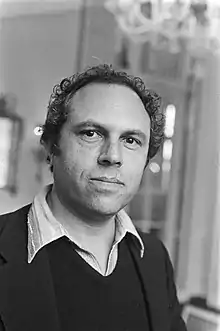Windows (Druckman)
Windows is a one-movement orchestral composition written by Jacob Druckman in 1972. It won the Pulitzer Prize for Music in the same year. Windows was commissioned by the Serge Koussevitzky Music Foundation for conductor Bruno Maderna and the Chicago Symphony Orchestra and is dedicated to conductor Serge Koussevitzky and his wife Natalie.
| Windows | |
|---|---|
| by Jacob Druckman | |
 Jacob Duckman, 1976 | |
| Commissioned by | Serge Koussevitzky Music Foundation |
| Composed | 1972 |
| Dedication | Serge and Natalie Koussevitzky |
| Duration | about 20 minutes |
| Movements | One |
| Scoring | Orchestra |
| Premiere | |
| Date | 16 March 1972 |
| Location | Orchestra Hall, Chicago |
| Conductor | Bruno Maderna |
| Performers | Chicago Symphony |
Druckman himself explained the name of the composition as follows:
The 'Windows' of the title are windows inward. They are points of light which appear as the thick orchestral textures part, allowing us to hear, fleetingly, moments out of time – memories, not of any music that ever existed before, but memories of memories, shadows of ghosts. The imagery is as though, having looked at an unpeopled wall of windows, one looks away and sees the afterimage of a face.[1]
Much of the work involves the use of aleatoric processes, similar to those associated with Witold Lutosławski. Windows was originally going to share a program with Claude Debussy's Jeux when it was premiered and Druckman wanted to pay homage to Debussy.[1]
A typical performance of the piece lasts about 20 minutes.
Instrumentation
The work is written for an orchestra with the following instrumentation.[2]
|
3 percussion players
|
|
References
- Malone, Andrew Lindemann. "Windows for orchestra". AllMusic. Retrieved 2020-05-02.
- Druckman, Jacob (1972). Windows. MCA Music.
- From the score: "though this part is written so that it can be accomplished by one player, it is much safer with two players".
- Small metal rings loosely hung on coils
- The long type with one end mounted in a wooden block which rests on the floor
